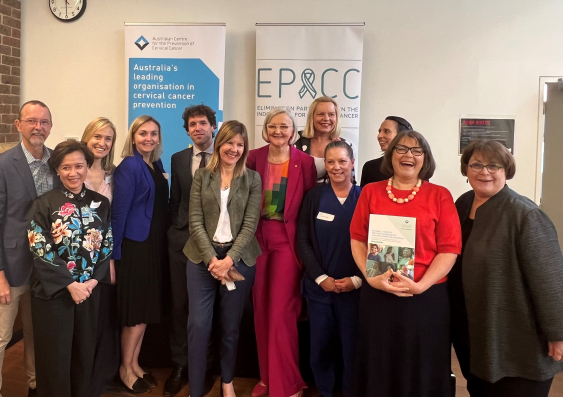Major Australian Government funding boost to eliminate cervical cancer
The Kirby Institute at UNSW Sydney is part of a consortium to receive funding and will lead program implementation in the Indo-Pacific.
The Kirby Institute at UNSW Sydney is part of a consortium to receive funding and will lead program implementation in the Indo-Pacific.

Australia is stepping up its regional leadership in the elimination of cervical cancer, with the announcement of a $12.5 million Australian Government grant to a consortium of leading Australian and international non-government health organisations. 
The Elimination Partnership in the Indo-Pacific for Cervical Cancer (EPICC) is the largest-ever initiative of its kind, leveraging Australian, international and in-country partner expertise to promote the World Health Organisation’s strategy for the elimination of cervical cancer. 
The EPICC consortium is comprised of the Kirby Institute at UNSW, The Daffodil Centre (a joint venture between the University of Sydney and Cancer Council NSW), Australian Centre for the Prevention of Cervical Cancer, Family Planning Australia, National Centre for Immunisation Research and Surveillance Australia, and global health agency Unitaid.  
The Kirby Institute will lead in-country implementation and program management support across the new network. The initiative builds upon the success of the Eliminating Cervical Cancer in the Western Pacific (ECCWP) program, which has supported the introduction of sustainable elimination policy and practice in Vanuatu and the Western Highlands region of Papua New Guinea. 
‚ÄúThis funding is a welcome boost to supporting cervical cancer elimination in our region,‚ÄĚ said¬†Professor Andrew Vallely, Head of Global Reproductive Health at the Kirby Institute.
‚ÄúThrough ECCWP, we have been able to offer vaccination, testing and treatment to thousands of women across Vanuatu and Papua New Guinea, which has saved lives. This new funding enables us to continue supporting our in-country partners in scaling up these efforts, facilitating more equitable access to these lifesaving interventions.‚Ä̬†
Read more: Major collaboration aims to eliminate cervical cancer in the Western Pacific 
The grant announcement coincides with the launch of , which puts Australia at the vanguard of cervical cancer elimination, with the Australian Government-funded EPICC consortium set up to accelerate parallel progress in the region.  
‚ÄúCervical cancer leads to huge global inequities in health outcomes, with countries like Australia on the cusp of reducing it to the status of a rare disease at the same time as it causes a terrible burden for women, families and entire communities on our doorstep,‚ÄĚ Prof. Vallely said.¬†
‚ÄúEPICC will work with partner countries in the region to implement interventions based on the WHO strategy for cervical cancer elimination, to put these countries on a sustainable footing, with the potential to save tens of thousands of lives in the short term, and millions over the century.‚Ä̬†